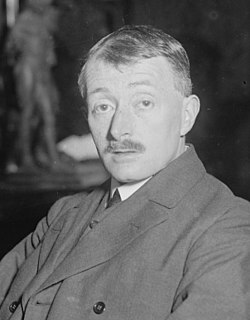A Quote by Jean Paul
He thought of the mouldering child, which laid its withered thin arms around his soul, as if it were his own, and to whom Death had given as much as a god gave to Endymion, — sleep, eternal youth, and immortality.
Related Quotes
There was no God in his heart, he knew; his ideas were still in riot; there was ever the pain of memory; the regret for his lost youth-yet the waters of disillusion had left a deposit on his soul, responsibility and a love of life, the faint stirring of old ambitions and unrealized dreams...... And he could not tell why the struggle was worth while, why he had determined to use to the utmost himself and his heritage from the personalities he had passed... He stretched out his arms to the crystalline, radiant sky. I know myself," he cried, "but that is all.
At that instant he knew that all his doubts, even the impossibility of believing with his reason, of which he was aware in himself, did not in the least hinder his turning to God. All of that now floated out of his soul like dust. To whom was he to turn if not to Him in whose hands he felt himself, his soul, and his love?
For I wondered that others, subject to death, did live, since he whom I loved, as if he should never die, was dead; and I wondered yet more that myself, who was to him a second self, could live, he being dead. Well said one of his friend, "Thou half of my soul"; for I felt that my soul and his soul were "one soul in two bodies": and therefore was my life a horror to me, because I would not live halved. And therefore perchance I feared to die, lest he whom I had much loved should die wholly.
Immortality—dazzling idea! who first imagined thee! Was it some jolly burgher of Nuremburg, who with night-cap on his head, and white clay pipe in mouth, sat on some pleasant summer evening before his door, and reflected in all his comfort, that it would be right pleasant, if, with unextinguishable pipe, and endless breath, he could thus vegetate onwards for a blessed eternity? Or was it a lover, who in the arms of his loved one, thought the immortality-thought, and that because he could think and feel naught beside!—Love! Immortality!
When later he [St. Joseph] carried the Child in his arms, acts of loving faith welled up constantly in his heart. It was a worship that pleased our Lord more than that which he receives in heaven. Picture to yourself Saint Joseph, adoring the little Child in his arms as his God. He tells of his readiness to die for Christ, of all his plans to promote Christ's glory, and to win more souls to his love. No lover builds more scintillating plans for his loved one than a saint.
If a man were to look over the fence on one side of his garden and observe that the neighbor on his left had laid his garden path round a central lawn; and were to look over the fence on the other side of his garden and observe that the neighbor on his right had laid his path down the middle of the lawn, and were then to lay his own garden path diagonally from one corner to the other, that man's soul would be lost. Originality is only to be praised when not prefaced by the look to right and left.
Those circumstances, which to the dim eye of Jacob's faith wore a hue so somber, were at that very moment developing and perfecting the events which were to shed around the evening of his life the halo of a glorious and cloudless sunset. All things were working together for his good! And so, troubled soul, the "much tribulation" will soon be over, and as you enter the "kingdom of God" you shall then see, no longer "through a glass darkly" but in the unshadowed sunlight of the Divine presence, that "all things" did "work together" for your personal and eternal good.
Those who have lost an infant are never, as it were, without an infant child. Their other children grow up to manhood and womanhood, and suffer all the changes of mortality; but this one alone is rendered an immortal child; for death has arrested it with his kindly harshness, and blessed it into an eternal image of youth and innocence.
If God bestowed immortality on every man then when he made him, and he made many to whom he never purposed to give his saving grace, what did his Lordship think that God gave any man immortality with purpose only to make him capable of immortal torments? It is a hard saying, and I think cannot piously be believed. I am sure it can never be proved by the canonical Scripture.
It is easy to say that you can adopt the whole human race as your children, but it is not the same as living in a home with a child and shaping all you do to help him learn to be happy and whole and good. Don't live your life without ever holding a child in your arms, on your lap, in your home, and feeling a child's arms around you and hearing his voice in your ear and seeing his smile, given to you because you put it into your heart.


































